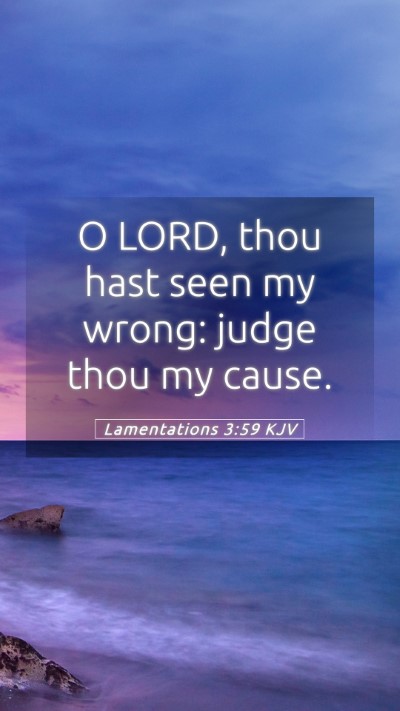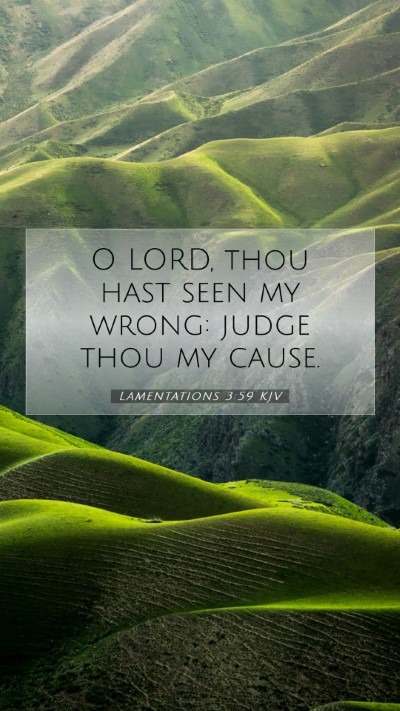Bible Verse Meaning: Lamentations 3:59
Verse: "O Lord, thou hast seen my wrong; judge thou my cause."
Overview of Lamentations 3:59
Lamentations 3:59 is a poignant appeal for divine justice from the prophet Jeremiah, who expresses his deep sorrow and the feeling of being wronged. This verse highlights the need for God’s intervention in times of trials and injustices.
Insights from Public Domain Commentaries
Matthew Henry's Commentary
Matthew Henry emphasizes the personal anguish of Jeremiah, illustrating how the prophet acknowledges his grievances before the Lord. He notes that this plea encapsulates an intimate relationship between the believer and God, where one can bring their concerns and hurts into prayer. The 'cause' Jeremiah refers to suggests an urgency in seeking justice, as well as a profound trust in God's ability to discern truth.
Albert Barnes' Notes on the Bible
Albert Barnes provides an analysis focusing on the aspect of God as a judge. He underlines that Jeremiah appeals to God not merely to acknowledge his sufferings, but to actively judge and take action against the injustices he has faced. Barnes points out that this verse demonstrates the faithfulness of God in hearing His people's cries and the importance of prayer in seeking relief from oppression. Additionally, he discusses the context of Jerusalem's destruction and the suffering of its inhabitants, further illuminating the prophet's emotional state.
Adam Clarke's Commentary
Adam Clarke elaborates on the broader implications of Jeremiah's lament. He posits that the plea for judgment reflects a sense of injustice that transcends individual experience, resonating with the collective suffering of a people in exile. Clarke emphasizes the lesson of turning to God for justice and the assurance that He sees and understands the plight of His followers. The call for judgment implies a hope for restoration and vindication, as Clarke articulates the ultimate hope embedded in this sorrowful cry.
Combining Insights for Deeper Understanding
The combination of these insights merges to form a rich understanding of Lamentations 3:59, indicating that:
- This verse serves as an assurance that God is aware of our struggles.
- It reflects the believer's dependence on God for justice, especially in times of suffering.
- The communal aspect of prayer during collective suffering is highlighted.
- This scripture encourages believers to voice their grievances to God, reaffirming His role as the ultimate judge.
- Jeremiah’s plea is both a personal lament and a call for God's righteousness in the face of oppression.
Historical Context
To understand Lamentations 3:59, it is crucial to consider the historical backdrop of the Babylonian exile. This period was marked by profound loss, sorrow, and a longing for justice among the people of Israel. As they faced the consequences of their sins, Jeremiah's plea encapsulates the hope for restoration amidst despair.
Application of the Verse in Daily Life
Lamentations 3:59 provides a framework for dealing with personal injustices and suffering. Believers are reminded that it is appropriate to bring their grievances before God. This verse encourages:
- Vocalizing one's pain and seeking divine counsel in times of distress.
- Maintaining faith in God's justice and timing while enduring hardships.
- Understanding that crying out for justice can be a part of a healthy prayer life.
Bible Cross References
Several other scriptures resonate with the themes found in Lamentations 3:59:
- Psalm 74:22 - "Arise, O God, and plead your own cause; remember how the foolish scorn you all day long."
- Psalm 7:8 - "The Lord judges the peoples; judge me, O Lord, according to my righteousness, and according to the integrity that is in me."
- Jeremiah 11:20 - "But, O Lord of hosts, who judges righteously, who tests the heart and the mind, let me see your vengeance upon them, for to you have I committed my cause."
Conclusion
Lamentations 3:59 serves as a heartfelt reminder of both the pain of injustice and the necessity of turning to God for redress. The commentaries of Matthew Henry, Albert Barnes, and Adam Clarke provide nuanced insights that enhance our understanding of this scripture, offering encouragement to all seeking Bible verse meanings and Bible verse explanations.
This verse invites continual exploration and reflection, making it relevant for Bible study groups, online Bible study, and individual Bible study lessons alike.


